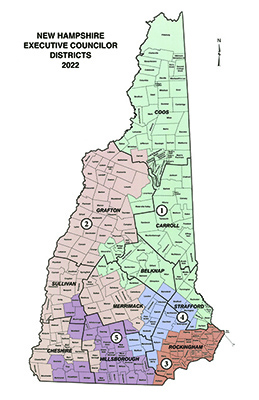About Us
An Overview of the Executive Council.
The Executive Council of the State of New Hampshire has the authority and responsibility, together with the Governor, over the administration of the affairs of the State as defined in the New Hampshire Constitution, the New Hampshire statutes, and the advisory opinions of the New Hampshire Supreme Court and the Attorney General.
Each of the five Executive Councilors represents one fifth of the population or approximately 263,000 citizens. Councilors are elected every two years, concurrently with the Governor. The Councilors participate in the active management of the business of the state. They receive assistance from the Commissioner of the Department of Administrative Services and the Attorney General who review requests involving state funds since no expenditure can be legally authorized without the availability of adequate funds.
To seek office as an Executive Councilor a candidate must be 30 years of age, a registered voter and domiciled in New Hampshire for at least 7 years. The candidate must also live in the district they are running in.
The New Hampshire "Governor and Executive Council" perform many valuable tasks that are of major importance to our fiscally conservative, very open government. Some of their more noteworthy duties and responsibilities are:

- All major executive branch business is conducted in public with the press present.
- All state Departments and Agencies must seek approval of both receipt and expenditures of state and federal funds, budgetary transfers within the department and all personal service contracts with a value of $10,000 and all contracts with a value of $10,000. (2018) Department of Administrative Services Manual of Procedures Section V.
- The Executive Council approves the spending of a major portion of the approximately 5.2 billion dollars that is appropriated annually by the legislature.
- Executive Councilors serve as watchdogs of the state treasury to ensure state departments do not spend more than was authorized by the legislature, nor allocate funds for items or services which the legislature has not sanctioned.
- The Executive Council approves the appointments of Judges, Commissioners, Notary Public, Justice of Peace, Commissioners of Deeds and hears Pardon Requests.
- The Executive Council plays a vital role in improving the state's infrastructure, especially roads and bridges, via management and oversight of the state's 10 year Highway Plan (GACIT).
- Executive Councilors make certain that those appointed to the executive branch of state government, whether Commissioners, Department heads or citizen members of the myriad of regulatory boards, agencies and commissions are all responsible to the citizens of New Hampshire and not to special interests. (List of commissions and boards)
- More importantly, Executive Councilors are the constituent's eyes and ears in Concord. They ensure the executive branch of state government is fiscally conservative and above reproach.
- Each biennium the Governor and Executive Council appoint more than 300 citizens to serve on various state agencies, boards and commissions. The Governor "nominates" and the Executive Council "confirms" unclassified state employees including Commissioners, Deputy Commissioners and Assistant Commissioners. They also confirm District, Superior and Supreme Court Justices, medical referees and military officers.
- Councilors are elected every two years to serve as advocates for the people.



